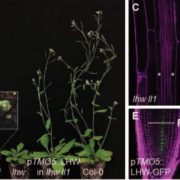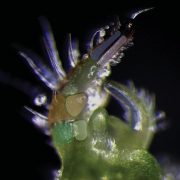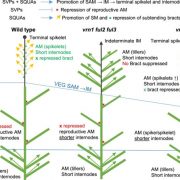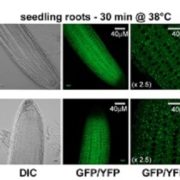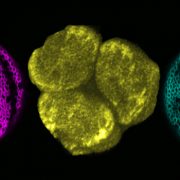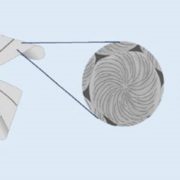A molecular rheostat adjusts auxin flux to promote root protophloem differentiation ($)
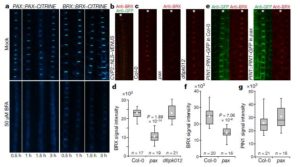 In plant development, auxin serves as a concentration-dependent signal that regulates cell differentiation, elongation and proliferation. The distribution of auxin is carried out by auxin efflux carriers such as PIN-FORMED (PIN) proteins and the specific accumulation of auxin directs organ differentiation and organization. Marhava et al. developed a mutant of the BREVIS RADIX (BRX) gene (which encodes for a plasma membrane-associated protein) and co-localizes with PIN protein at the developing protophloem sieve elements (PPSEs) in the root tip. In the brx mutants, they found that the protophloem often does not differentiate, lacks characteristic changes in the cell wall and lowers the accumulation of auxin. Furthermore, they evaluated the role of AGC kinases in the protophloem differentiation, studying an interesting protein that co-localizes with PIN at PPSEs and interacts strongly with BRX, a PROTEIN KINASE ASSOCIATED WITH BRX (PAX), by obtaining pax mutants. Results indicated pax mutants represent hypomorphic phenocopies of brx mutants, also with protophloem differentiation defects. This is interpreted as PAX and BRX act together to regulate, like a rheostat, the effects of auxin on protophloem differentiation. (Summary by Jonathan Israel Chapa García and Maria Julissa Ek-Ramos) Nature 10.1038/s41586-018-0186-z
In plant development, auxin serves as a concentration-dependent signal that regulates cell differentiation, elongation and proliferation. The distribution of auxin is carried out by auxin efflux carriers such as PIN-FORMED (PIN) proteins and the specific accumulation of auxin directs organ differentiation and organization. Marhava et al. developed a mutant of the BREVIS RADIX (BRX) gene (which encodes for a plasma membrane-associated protein) and co-localizes with PIN protein at the developing protophloem sieve elements (PPSEs) in the root tip. In the brx mutants, they found that the protophloem often does not differentiate, lacks characteristic changes in the cell wall and lowers the accumulation of auxin. Furthermore, they evaluated the role of AGC kinases in the protophloem differentiation, studying an interesting protein that co-localizes with PIN at PPSEs and interacts strongly with BRX, a PROTEIN KINASE ASSOCIATED WITH BRX (PAX), by obtaining pax mutants. Results indicated pax mutants represent hypomorphic phenocopies of brx mutants, also with protophloem differentiation defects. This is interpreted as PAX and BRX act together to regulate, like a rheostat, the effects of auxin on protophloem differentiation. (Summary by Jonathan Israel Chapa García and Maria Julissa Ek-Ramos) Nature 10.1038/s41586-018-0186-z


